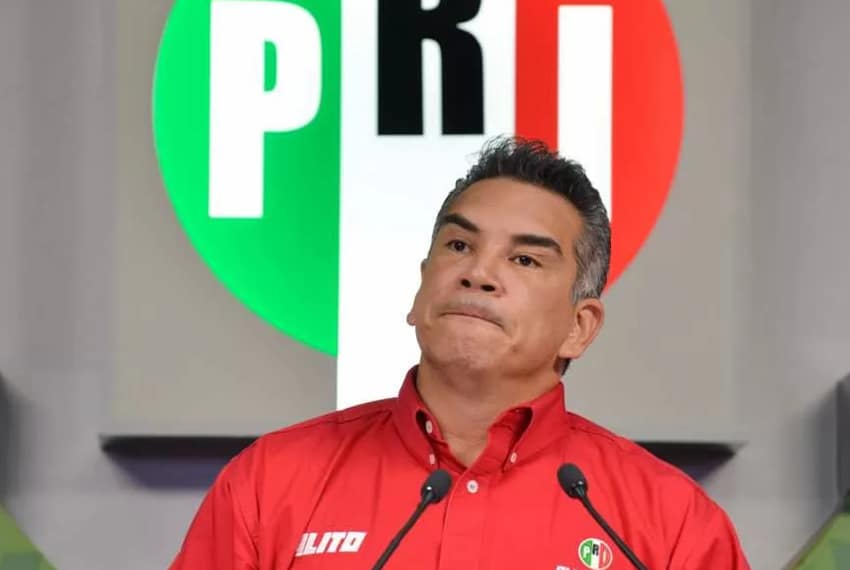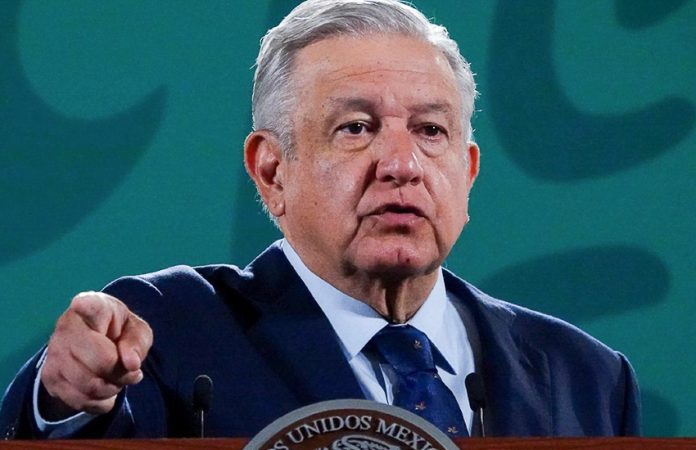A new, highly pragmatic yet unlikely political pact appears to be brewing in Mexico.
In remarks that indicate he is prepared to dance with those he regards as one of the devils of Mexican politics, President López Obrador on Tuesday floated the possibility that the ruling Morena party, which he founded, could forge an alliance with the Institutional Revolutionary Party (PRI), Mexico’s once omnipotent party whose name became a byword for corruption.
López Obrador, who says he is in the process of transforming Mexico and curing it of ills that have plagued it for decades, is talking up the possibility of striking a deal with the PRI — a party he has blamed for all manner of problems in Mexico — so that Morena can reach a supermajority in the Congress. The move would allow him to enact constitutional changes, among which, critics say, could even be a bid to extend his rule beyond the single-term limit of six years.
“With Morena, the Labor Party and part of the Green Party, not all [deputies], there is a majority of 50% plus one, what I call a simple majority,” said AMLO, as the president is best known, referring to the results of Sunday’s congressional elections, which showed that the ruling party and its allies would maintain its majority in the Chamber of Deputies but lose the two-thirds control it currently enjoys.
“If you wanted to have a supermajority, which is two-thirds, an agreement could be reached with some of the PRI legislators or those of any other party, … not many are needed for constitutional reform,” the president told reporters at his morning news conference.

But it takes two to tango, and surely the PRI wouldn’t enter into an uneasy alliance with the party that unceremoniously stripped it of power in 2018 and blames it frequently for Mexico’s persistent problems, such as corruption, insecurity and economic inequality.
But it’s apparently not as simple as that.
The national leader of the PRI, which entered into a coalition with the conservative National Action Party (PAN) and the leftist Democratic Revolution Party (PRD) to contest the June 6 elections in many districts and states, indicated that the party is at least willing to discuss the president’s proposition.
“An opposition bloc was built in order to have a joint agenda. [But] that doesn’t set aside the fact that the PRI has its own agenda and will sit down to talk with the president,” PRI leader Alejandro Moreno said Tuesday, adding that he wouldn’t allow himself to be influenced in such discussions by the federal government’s persecution of his party.
However, not all priístas, as PRI politicians, members and supporters are known, were as open as Moreno to the party discussing a pact with Morena.
“The dialogue [with the president and Morena] must be with the opposition front, not with him [Moreno] nor with the PRI,” said Coahuila Governor Miguel Riquelme.
Any talks aimed at reaching a supermajority in Congress must be governed by the national interest, not the interest of the 4T (the fourth transformation), the governor said, referring to the federal government by its self-anointed nickname.
In addition to musing about how his government could reach a coveted supermajority, AMLO has used this week’s morning press conferences to talk up Morena’s election performance and offer an assessment as to why it didn’t fare better, especially in Mexico City, where the party lost considerable ground.
The president declared Monday that he was “happy, happy, happy” with the results of the lower house election, asserting that they favor the ongoing “transformation of Mexico,” even though the number of seats held by the Morena-led coalition in the Chamber of Deputies will fall from 334 to below 300.
The opposition parties couldn’t wrest control of the lower house despite warning Mexicans that “either we leave [the government] without the chamber or it will leave us without a country,” AMLO boasted. “Well, they couldn’t [do it]. And there is a country for everyone, and a preference for the poor,” he said.
The president also emphasized that with a simple majority in Congress, his government wouldn’t have any problem getting its annual budget approved.
Although his remarks suggest otherwise, López Obrador has, at best, muted cause for celebration vis-à-vis the federal election results, given that the ruling party lost both its own majority and the supermajority it shares with its allies.

Nevertheless, Morena clearly demonstrated that it remains Mexico’s most potent political force, winning almost double the vote of its clearest rival, the PAN, in the federal poll and triumphing in 10 or 11 of the 15 state gubernatorial elections, a result that will allow it to govern about half of Mexico’s states.
The party, however, lost its tight grip on the capital, winning only six or seven of the 16 boroughs, at least four fewer than it currently governs.
López Obrador identified negative media coverage of the government and a tragic subway accident that claimed the lives of 26 people last month as among the reasons why Morena didn’t fare better in the capital.
“… We have to take into account that here [in Mexico City] there is more media bombardment; here is where the dirty war is felt more. Here is where you can read that magazine from the United Kingdom, The Economist,” he said Monday.
The Economist published an editorial late last month that was highly critical of the president and urged Mexicans to vote against Morena.
“Everything is here [in Mexico City]. I’ve always said you put the radio on, and it’s against, against, against, against [the government]. You change the station and it’s the same. So, it bewilders and confuses [people]. It’s propaganda, day and night, against [us],” López Obrador said, characterizing the media’s coverage of politics as “perverse, biased, slanderous and toxic.”
On Tuesday, the president said that some Mexico City residents punished Morena for the subway crash, which occurred on a new line that was mainly built when Marcelo Ebrard, the federal foreign minister, was mayor, and appeared to be caused by structural faults in an overpass.
The people most affected by the accident, such as residents of the southeastern boroughs of Iztapalapa and Tláhuac, which are served by Line 12, didn’t vote in large numbers against Morena, but those in more affluent parts of the city did, López Obrador said.
“The most affected people, those in Iztapalapa and Tláhuac — humble, hard-working, good people — understand that these things unfortunately happen, and it doesn’t have a political, electoral impact … [in those boroughs]; However, in the middle class, upper-middle-class neighborhoods, it does,” AMLO said.
Indeed, Morena won most of Mexico City’s poorer boroughs, many of which are located on the capital’s eastern side, while the PAN-PRI-PRD coalition took the more affluent ones, situated on the western side.
That result spawned countless memes, including maps that showed a West Berlin/East Berlin type scenario in which Mexico City was split down the middle with residents in eastern boroughs living in the “communist” east controlled by Morena and those in western boroughs residing in the “capitalist” west governed by the PAN-PRI-PRD alliance.
With reports from El País (sp), Milenio (sp) and Reforma (sp)
